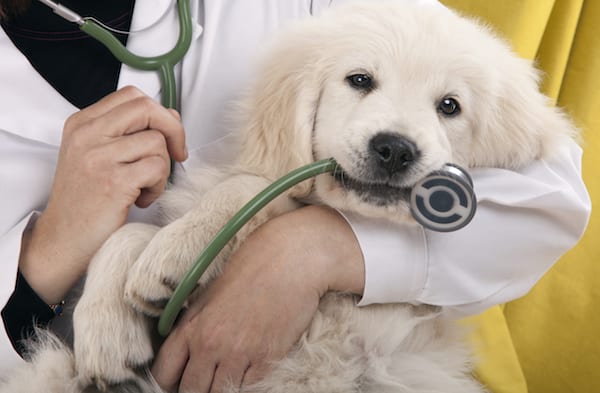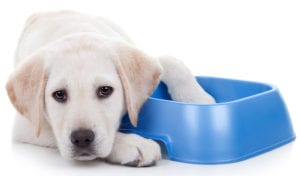
Puppy Care 101: The Top 5 Puppy Care Tips Designed To Keep Your Pup Healthy & Happy
In honor of National Puppy Day on March 23rd, Sky Canyon Veterinary Hospital offers expert advice on the top 5 puppy care tips that will help keep your puppy healthy & happy.
It’s a universal thing that most people cannot resist a puppy, and this is a time of year when many folks bring home new puppies. What’s not so well known are the puppy care tips that will help create a healthy transition from puppy to adult dog. By learning about the top puppy care tips – and typical hazards – new puppy owners can help develop a healthy dog for the long term.
DID YOU KNOW: Puppies grow at the fastest rate during the first five months of their lives.
Puppy Care Tip 1: Puppy Food & Feeding Advice
 Puppies have vastly different nutritional needs than adult or senior dogs, because they are growing so fast, and need extra nutrients to help the growth of bones, muscles & organs.
Puppies have vastly different nutritional needs than adult or senior dogs, because they are growing so fast, and need extra nutrients to help the growth of bones, muscles & organs.
In general, puppies should start getting solid food starting at 4 weeks because they are no longer able to get all the calories & nutrients from mother’s milk that’s needed for their growth spurt. Typically, puppies are fully transitioned to solid food at 6 weeks.
This is the stage when you’ll need to find a high-quality puppy food. It should be labeled specifically as “puppy food.” Just like food companies for people, there are thousands of pet food companies. The options can be overwhelming. In general, Dr. Respet is more comfortable with the pet food companies that utilized an accredited veterinary nutritionist to develop their pet food blends, and which periodically test samples of their products to ensure label compliance, i.e. what’s on the label is in the food.
One starting point for researching information on puppy & adult dog foods, as well as any pet food or pet treat recalls is www.dogfoodadvisor.com. However, just like any information you find on the internet, it should not be taken as gospel.
Like people, no pet food will work for every individual puppy or adult dog, and some animals can be sensitive to certain ingredients in the pet food. For example, if your pet is sensitive to chicken, it will not make a difference if it is the finest chicken in the world. Your pet will still be sensitive to that ingredient.
Once you find a food that your puppy likes and is doing well, we don’t recommend switching foods much, as it usually results in gastro-intestinal upset.
Puppy Food Buying Tip: Once you’ve researched quality puppy foods, buy the food in small bags first to make sure your puppy likes the taste of the food and that the food agrees with your puppy’s digestive system.
If possible, feed your puppy 3 times a day so nutrition is running through their bodies consistently while bone, muscle & organs are developing. If your work schedule doesn’t permit this, try for 2 times a day, in the morning and the evening after work.
Puppy Feeding Tip: Monitor how much you feed. Here’s how:
- Start by following the guidelines for weight & portions on the dog food packaging. The portions being fed may need to be adjusted depending on the activity level and body condition of your puppy.
- Consult with your veterinarian about how your puppy is developing and recommendations for feeding frequency and portions.
- It’s VERY important that you use a large-breed puppy food for large-breed dogs.
Special Feeding Tips for Large-breed Puppies:
- It’s critically important that you follow calorie & portion guidelines for large-breed puppies meticulously.
- Medical research shows that overfeeding large-breed puppies can increase the likelihood of joint and skeletal problems, including hip dysplasia, later in life.
- To offset this, we recommend that you consider feeding food specifically formulated for large-breed puppies. Large-breed puppy foods have less calcium & phosphorous than puppy food for more moderately sized dogs. This special formulation is designed to help prevent skeletal & joint problems as your large-breed puppy grows up.
Puppy Care Tip 2: Vaccinations
While there’s plenty of debate on vaccines for humans and animals, there are some diseases that must be stopped in their tracks, for the long-term health & well-being of your puppy.
Vaccine recommendations are based on the chances of your puppy getting a disease, getting sick, or dying from the disease…balanced against any possible side effects of vaccination.
Puppies get antibodies from their mother’s milk. But as they are weaned off mother’s milk and onto solid food, the typical rule of thumb is to apply 3 rounds of puppy vaccinations at intervals of 3-4 weeks for the most important vaccines.
There are 2 classes of vaccines: Core & Non-core.
- Core Vaccines: These essential vaccines are vital to your puppy’s health, and include: canine parvovirus, distemper, canine hepatitis & rabies.
- Non-core Vaccines: These additional vaccines may be recommended, depending on your pet’s chance of exposure, how dangerous the disease is, its’ “zoonotic” potential (whether the disease can be passed on to people), and lifestyle. Some non-core vaccines often are required if you’re going to board your dog at a kennel. Non-core vaccines include: Bordetella bronchiseptica, Borrelia burgdorferi, canine influenza & Leptospira bacteria.
Occasionally, pets may experience side effects from getting vaccines. Typically, this is limited to lethargy (low energy) for 12-24 hours. In very rare instances, possible side effects may include:
- Fever
- Lethargy
- Vomiting
- Diarrhea
- Difficulty Breathing
Puppy Care Tip 3: Puppy Proof Your Home
 The biggest puppy emergencies come from them swallowing something that cannot pass from the stomach to the digestive tract. Puppy proofing the house and yard helps avoid this. Typical steps for puppy proofing your home include:
The biggest puppy emergencies come from them swallowing something that cannot pass from the stomach to the digestive tract. Puppy proofing the house and yard helps avoid this. Typical steps for puppy proofing your home include:
- Keep dangerous items out of reach, including power cords
- Secure trash cans
- Don’t leave socks or other dirty laundry laying around, or on the floor.
- When your puppy is playing with toys, supervise them and watch for signs of them biting off and swallowing parts of toys
- Puppy Safety Tip: Toys with ropes are particularly dangerous. If they swallow part of a rope toy, part of the rope can get stuck in the stomach while the rest of the rope or string is trying to move into the small intestine. If it gets stuck between the two, the rope can literally “saw” and perforate the intestine so stomach contents end up in the abdomen. This is life threatening and usually requires expensive surgery to save their lives.
Puppy Care Tip 4: De-Worm Your Puppy
It’s quite common for puppies to get hookworms or roundworms through mother’s milk, or even while in the womb. Because worms are so common in puppies, it’s a common practice to de-worm puppies between 8-12 weeks of age. De-worming involves giving your puppy a de-worming medication.
Heartworm is a different process. Heartworms take 6 months to mature so you typically won’t see symptoms until your puppy is about six months old.
Note to Pet Parents: In March of 2018, Sky Canyon Veterinary Hospital is offering a FREE de-worming as part of a puppy exam.
Puppy Care Tip 5: Don’t Use Over-the-Counter Flea & Tick Remedies on Your Puppy
Many over-the-counter flea & tick remedies are dangerous for puppies and can kill them. Flea & tick remedies used by your veterinary hospital undergo a more rigorous review and must be approved by the FDA. If you think your puppy has fleas or ticks, please consult with your veterinarian first and don’t apply flea & tick shampoos and other over-the-counter treatments.
Hopefully, these puppy care tips will provide the basics for you to both enjoy your puppy as its growing up, as well as ensuring that it grows up to be a healthy & strong dog.
If you or someone you know has a new puppy, please start their young lives off right with a puppy exam from Sky Canyon Veterinary Hospital in Grand Junction, Colorado. Call us at: 970.985.4911, or Email Us to schedule a puppy exam. In February 2018, we’re offering FREE de-worming as part of puppy exams.
